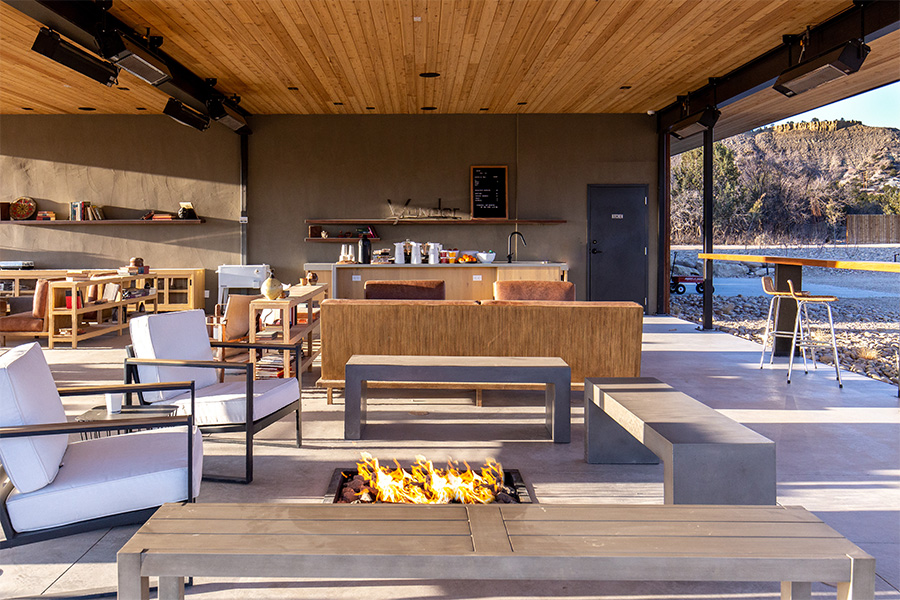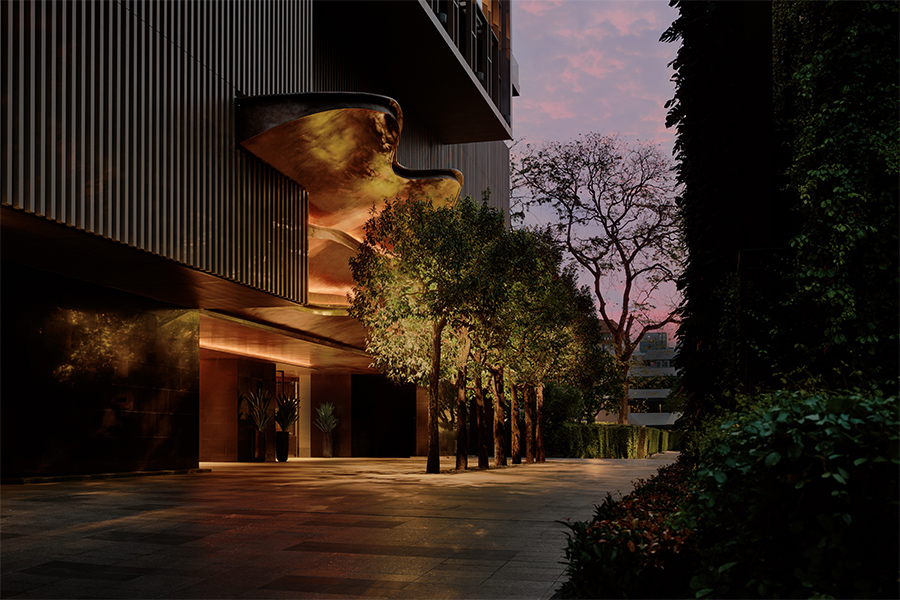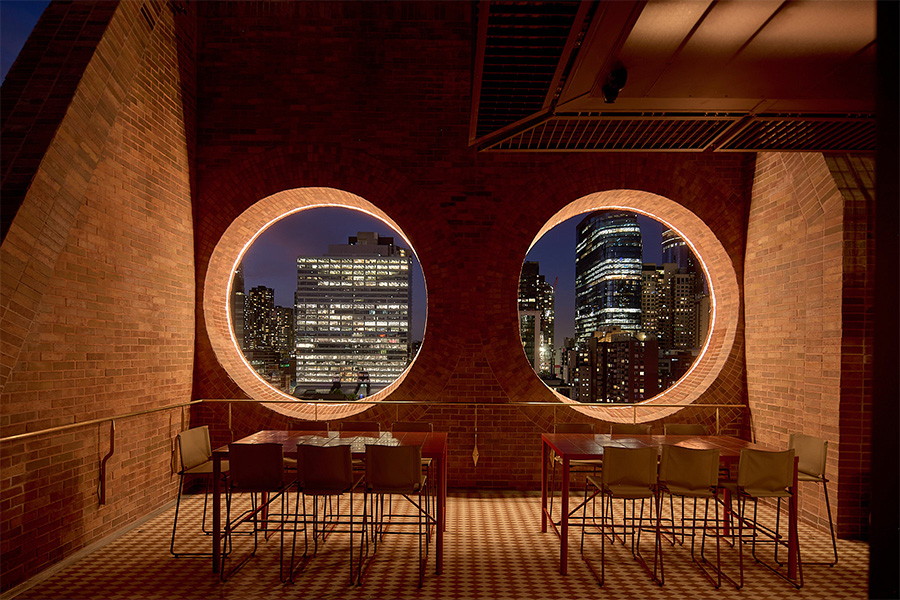As hospitality shifts its focus to a more accessible, affordable, and meaningful approach, brands are popping up with inclusivity and wellbeing as core philosophies. Here are four brands that are responding to the desire of travelers who want to both feel and do good.
Yonder Hospitality

A firepit is the centerpiece of the indoor-outdoor lodge at Yonder Escalante
The allure of the American West inspired James Tate, head of design for Preserve Partners, to embark westward and launch a new RV park prototype. But the lodging market he found along the way was overdue for a revolution. “The offerings available for people with RVs or people wanting to camp weren’t great,” he says. Tate eventually purchased a former RV park near Grand Staircase-Escalante National Monument in Utah. He enlisted Santa Barbara, California-based Anacapa Architects and Hannah Collins, founder and principal of ROY Hospitality Design Studio, to help him shake up the sector.
The partnership would not only yield the recently debuted Yonder Escalante, but also its parent company, Yonder Hospitality, of which Collins is CEO and that already has a second outpost in the works outside of Yosemite Valley in California. “I’ve always been intrigued by alternative hospitality, and I love the boutique nature of this sector,” she says. “There’s a huge opportunity to bring great hospitality in and around national parks and monuments.”
Comprising prefab units, restored Airstreams, and an onsite water treatment facility, Yonder Escalante offers a simple, modernist aesthetic. An indoor-outdoor clubhouse and a pool and hot tub await guests after a day of exploration, while the site’s original drive-in theater has also been preserved and populated with revitalized classic cars from which guests can enjoy a screening under the stars. “We wanted something that felt like it wasn’t necessarily outdoorsy but was driven by nostalgia for Americana or the American road trip,” Collins says.
SIRO

Guestrooms at SIRO Boka Place will evoke a relaxed and serene vibe
SIRO, Kerzner International’s newest brand, empowers guests through wellness both during their travels and beyond. “Holistic wellbeing is a lifestyle, not a trend,” says Kerzner CEO Philippe Zuber. “There are very few existing brands that have placed fitness and wellbeing at the center of the guest experience in the same way that SIRO will.”
SIRO—Strength, Inclusive, Reflection, Original—will debut in 2023 with SIRO Boka Place in Montenegro, a collaboration between concept architect HMA and local architecture firm Arhi.Pro. Home to 96 guestrooms and 145 residences, the property will feature a contemporary design expressed through a muted palette of exposed concrete and gray furnishings. A collaboration with LEED and the International WELL Building Institute will prioritize sustainability, with a focus on air, water, and light quality, as well as thermal and sound proofing. In addition to the 4,000-square-foot Recovery Lab, rooms will pair desks with exercise balls instead of chairs and offer ample space for working out or reflection. “We are designing our guestrooms for recovery and restoration,” Zuber says.
Trainers, coaches, and dieticians will curate health and fitness plans that “will continue post-visit with vitality tracking and access to virtual training sessions and an engaged global community,” Zuber adds. “We hope SIRO guests will fully embrace our mission and become inspired to be the best version of themselves.”
Patina

A plunge pool and extensive patio define a water villa at the Patina Maldives, Fari Island
As the more affordable sibling to Capella’s luxury brand, Patina is a celebration of the nomadic lifestyle. The debut—the 90-room Patina Maldives, Fari Island—will open near Capella Maldives this May, and though it will serve a separate market and pricepoint, it embodies the same high-end craftsmanship as its sister brand.
Designed by Brazilian architect Marcio Kogan of Studio MK27, the resort will be infused with biophilic elements that harmonize with its location. Kogan “conjures spaces and atmospheres that encourage deep connections with nature, as well as communion with other people,” says Capella Group CEO Nicholas Clayton. “Delicate architectural lines remain respectfully low, never breaching the horizon of sea and sky, unfolding invitingly into the surrounding island life—a simultaneous experience of isolation and belonging.”
Sustainability is also a priority. “We call this perpetuity—our neverending journey to making a positive impact on people and places,” Clayton adds. Kitchens operate on a zero-waste basis; there is a permaculture garden to reduce food miles and encourage guests to forage; and the resort is home to a 100-percent solar-powered kids club and recreation and dive center. As a member of the Fari Islands Collective, the brand also contributes 1 percent of its gross operating profits to fund initiatives that support Maldivian women and children, focusing on communities impacted by climate change.
Greet

The colorful lobby at Greet Bordeaux Aéroport, designed by Option d’interieur
Joining Accor’s powerhouse portfolio is Greet. Launched in 2019, the economy brand touts itself as being respectful of people and the planet. Counting four properties found throughout France and Germany, Greet has 15 properties in the pipeline—including flagship locations in Vienna, London, and Lyon—and has ambitious plans to open 300 by 2030. It’s “about expansion, but with discipline,” says chief development officer Agnes Roquefort.
Guided by the principle that good actions fuel good feelings, Greet is committed to minimizing its environmental footprint. One of the most visible indicators is the recycled and repurposed furniture found throughout its properties. Take a metal element that pops up in the Lyon Confluence location. While onsite with an outdoor furniture manufacturer, French designer Franck Cousin noticed waste being produced from the process—a hexagon shape that was being thrown away. Cousin repurposed the pieces into a mosaic that appears on tabletops and in guestrooms. “It looked like it cost a fortune,” recalls Damien Perrot, Accor’s global senior vice president design.“Thanks to that process, we brought something high quality to the hotel.”
Like many other Accor brands, Greet relies on the company’s circular hospitality mission, which focuses on less production, less waste, and less environmental damage. “Our approach is very pragmatic, and we want to be authentic and tell the truth to our customers,” adds Perrot. “When guests check-in to a Greet hotel, they will never forget that they are in a place with a strong focus on sustainability; they will just think they’re in one of the best-designed hotels they have experienced at the 2-Star level.”
This article originally appeared in HD’s May 2021 issue.
More from HD:
The 17th Annual HD Project Awards Finalists
Mayflower Inn & Spa Charms Once Again in Connecticut
How Paris Is Reinventing Itself as a Green City



